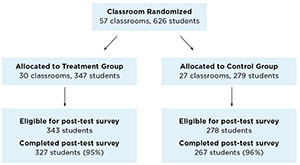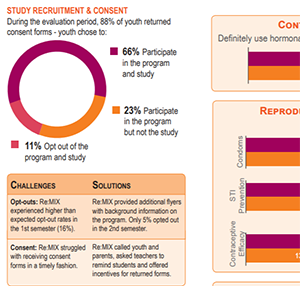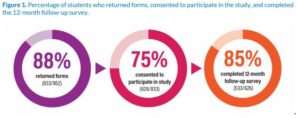Re:MIX evaluation
Child Trends collaborated with EngenderHealth to evaluate Re:MIX, a sexual health education program aimed at reducing rates of unplanned pregnancy and sexually transmitted infections, and piloted in three schools with majority Latinx populations in Texas. Re:MIX pairs young parent educators with professional health educators to co-facilitate its curriculum to students in grades 8–10. Child Trends’ role for this project, as the lead evaluator, was to conduct an impact and implementation evaluation of the program. Child Trends teamed with EngenderHealth to recruit students and administer surveys, and to collect data on program implementation through interviews with facilitators and school administrators and focus groups with student participants.
To assess program impact, Child Trends conducted a randomized control trial to assess the effects of the program on behavioral outcomes (sexual experience and unprotected sex) and associated mediators. Impact evaluation findings suggest that, immediately after participants’ completion of the program, Re:MIX had a positive impact on their intentions to use long-acting/hormonal contraception, reproductive health knowledge, ability to ask for and give consent, and knowledge of where to obtain birth control. Impacts on these mediating outcomes were sustained at the 12-month follow-up. There were no significant findings on the measured behavioral outcomes.
Related Documents:
Lessons from an Evaluation of a School-Based Teen Pregnancy Prevention Program in Texas
 This resource introduces the Re:MIX program and describes Child Trends’ approach to evaluating Re:MIX’s impact on teen pregnancy and sexual health. For this study, Child Trends recruited a sample of more than 600 students in grades 8-10 across 57 classrooms at three public charter schools in Austin, Texas. The resource presents the evaluation successes and lessons learned along the way.
This resource introduces the Re:MIX program and describes Child Trends’ approach to evaluating Re:MIX’s impact on teen pregnancy and sexual health. For this study, Child Trends recruited a sample of more than 600 students in grades 8-10 across 57 classrooms at three public charter schools in Austin, Texas. The resource presents the evaluation successes and lessons learned along the way.
This report presents key implementation findings from the five-year evaluation of Re:MIX, a sexual health education program aimed at reducing rates of unplanned pregnancy and sexually transmitted infections. A key component of the program is the pairing of young parent educators with experienced health educators to lead the curriculum. This publication highlights the many challenges and lessons learned in implementing and evaluating Re:MIX in three public charter schools in Austin, Texas with a population of mostly Latinx students in grades 8–10.
Blog: Understanding pre-sexual behaviors can help tailor pregnancy prevention programs to teens
Although most young teens are not engaging in vaginal sex, many are engaging in pre-sexual behaviors that can lead to vaginal sex. This blog highlights notable differences in reproductive health knowledge, attitudes, intentions, and behaviors among teens who have no sexual experience and teens who have had pre-sexual experience. Findings indicate the importance of making this distinction when tailoring teen pregnancy prevention programs for younger, mostly abstinent, adolescents.
This brief provides teen pregnancy prevention program implementers and evaluators with survey items and outcome measures to consider when assessing the impact of their programs. It includes measures and scales from four mediating outcome domains (intentions, knowledge, self-efficacy, and attitudes about sexual activity and contraceptive use) that are linked to reproductive health behaviors.
Presentation: Evaluation of the Re:MIX teen pregnancy prevention program for Latinx youth
Accepted at the Society for Adolescent Health and Medicine conference, March 11-14, 2020 (canceled due to COVID-19 concerns)
Jennifer Manlove, Kate Welti, Jane Finocharo, Bianca Faccio, Samantha Ciaravino, Brooke Whitfield
This presentation highlights impact findings from our randomized control trial of Re:MIX. Promising short- and long-term findings related to self-efficacy, knowledge, and intentions suggest Re:MIX can be successful with Latinx students.
Accepted at the Society for Adolescent Health and Medicine conference, March 11-14, 2020 (canceled due to COVID-19 concerns)
Kate Welti, Brooke Whitfield, and Jennifer Manlove
This poster presents findings on pre-sexual experience among a sample of students who participated in the evaluation of Re:MIX, a teen pregnancy prevention program (TPP). Findings highlight the importance of accounting for pre-sexual experience when evaluating TPP programs and in determining which curricula are most effective with younger, less sexually experienced teens.
This research brief presents recommendations for achieving high response rates in evaluations of school-based programs for adolescents, learned through the recent evaluation of Re:MIX, a teen pregnancy prevention program implemented in charter schools with primarily Latinx students in grades 8 through 10.
Perspectives on Young Parents as Peer Educators in a Teen Pregnancy Prevention Program
 This brief describes the peer educator model used in the Re:MIX program and the findings from focus groups and interviews conducted with peer educators, adult health educators, and program staff. The brief also includes summaries of educator and program staff feedback, along with key quotes.
This brief describes the peer educator model used in the Re:MIX program and the findings from focus groups and interviews conducted with peer educators, adult health educators, and program staff. The brief also includes summaries of educator and program staff feedback, along with key quotes.
 This brief presents findings on Re:MIX students’ differing baseline levels of sexual experience; whether pre-sexual experience at baseline predicts vaginal sex at 12-month follow-up; and how the knowledge, attitudes, and intentions of students who had pre-sexual experience at baseline compared to those who had no sexual experience or those who had had vaginal sex at baseline. Findings highlight the importance for program implementors and evaluators of understanding these distinct groups.
This brief presents findings on Re:MIX students’ differing baseline levels of sexual experience; whether pre-sexual experience at baseline predicts vaginal sex at 12-month follow-up; and how the knowledge, attitudes, and intentions of students who had pre-sexual experience at baseline compared to those who had no sexual experience or those who had had vaginal sex at baseline. Findings highlight the importance for program implementors and evaluators of understanding these distinct groups.
Poster: Ready to Re:MIX — An Innovative Youth Sexual Health Education Program
 Presented at Healthy Teen Network’s 2019 Annual Conference, October 28-30, 2019; at Family & Youth Services Bureau’s 2019 Adolescent Pregnancy Prevention Conference, June 24-26, 2019; at Family & Youth Services Bureau’s 2018 Adolescent Pregnancy Prevention Conference, May 30-31, 2018; and at Healthy Teen Network’s 2017 Annual Conference, October 2-4, 2017; authored by Child Trends and EngenderHealth staff
Presented at Healthy Teen Network’s 2019 Annual Conference, October 28-30, 2019; at Family & Youth Services Bureau’s 2019 Adolescent Pregnancy Prevention Conference, June 24-26, 2019; at Family & Youth Services Bureau’s 2018 Adolescent Pregnancy Prevention Conference, May 30-31, 2018; and at Healthy Teen Network’s 2017 Annual Conference, October 2-4, 2017; authored by Child Trends and EngenderHealth staff
This poster provides descriptive characteristics of Re:MIX participants, as well as details on the curriculum, study design, lessons learned, and short-term impact results for outcomes related to behaviors, attitudes, self-efficacy, and intentions.
Roundtable deliverable at American Public Health Association’s 2018 Annual Meeting, November 10-14, 2018
This one-page handout provides a brief description of the Re:MIX program and curriculum, peer educator model, study design, and study reach, along with descriptive characteristics of the participants.
© Copyright 2024 ChildTrendsPrivacy Statement
Newsletter SignupLinkedInThreadsYouTube